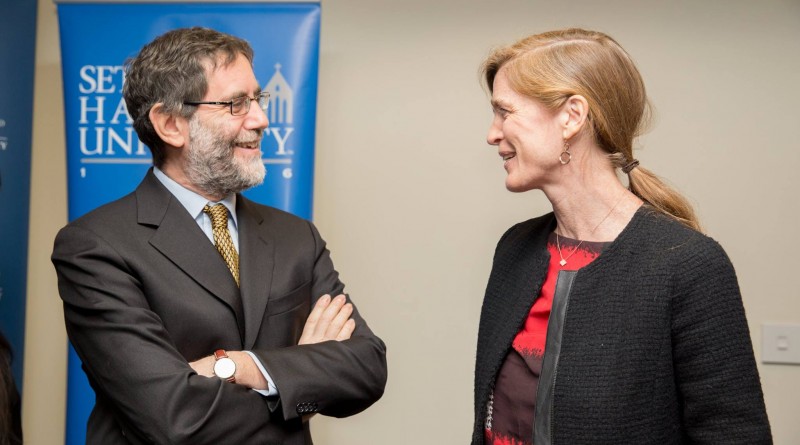Samantha Power: “Little Will Happen” Without US Leadership
By Angelo Piro
Staff Writer
On January 13, United States Ambassador to the United Nations Samantha Power delivered an address at Seton Hall University on the foreign policy outlined in President Barack Obama’s final State of the Union. In his welcoming remarks, School of Diplomacy Dean Andrea Bartoli reflected on the importance that the event represented as an opportunity for dialogue.
Ambassador Power took the opportunity to share her perspective on President Obama’s foreign policy plan for his final year in office, as well as reflect on the progress she and the administration have made over the years.
Reiterating statements made by the president, Ambassador Power reaffirmed her belief that the United States still stands strong and respected on the world stage. She also emphasized that the objective of President Obama’s foreign policy, from the beginning of his presidency to his last days in office, has always been to ensure American strength and security, rebuking those who have claimed that the United States has faced a decline in respect and prestige.
“If there’s one formula for every encounter, they’re going to be asking the United States to lead, and believing that little will happen if the United States does not,” said Power.
She laid out what she viewed as the guiding principles of American leadership abroad, both in the past and going forward: coalition-building and multilateralism, principled engagement with all parties, and preservation of American values.
On coalition-building, Ambassador Power made clear that, while the U.S. has the means to solve many of the world’s problems, the U.S. must engage other nations in reaching shared goals in order to defray the costs to the U.S. and strengthen collective efforts. She highlighted the recent climate change agreement signed in Paris as one example, and spoke on how she and the President are bringing this same engagement to the fight against ISIS. According to Power, multilateral tools are an extension, not an alternative, to standard U.S. practices.
Specifically, Power stated that diplomacy should become a standard of the foreign policy toolbox, as in her experience, she has found that engagement rather than isolation is far better in affecting change.
She highlighted the work of the Obama administration in Iran and Cuba, and spoke at length of U.S. commitment to better living conditions within Cuba despite the recent rapprochement, stressing America’s commitment to the highest moral values. The Syrian refugee crisis, for Ambassador Power, is the greatest challenge to American moral leadership, as many seek to limit a refugee’s ability to enter the US. On this topic, the ambassador spoke with the most candor, featuring several refugee families and refugee advocates in the audience, and speaking on her experience as the child of immigrants.
Ambassador Power also took time to answer questions from students and members of the Seton Hall community. These interactions ranged from questions on the U.S. policy for Central American refugees, anecdotes from her time as U.N. Ambassador, and her take as a journalist turned policymaker on how to engage the public in foreign policy matters.
The full text of Ambassador Power’s remarks can be found here.

